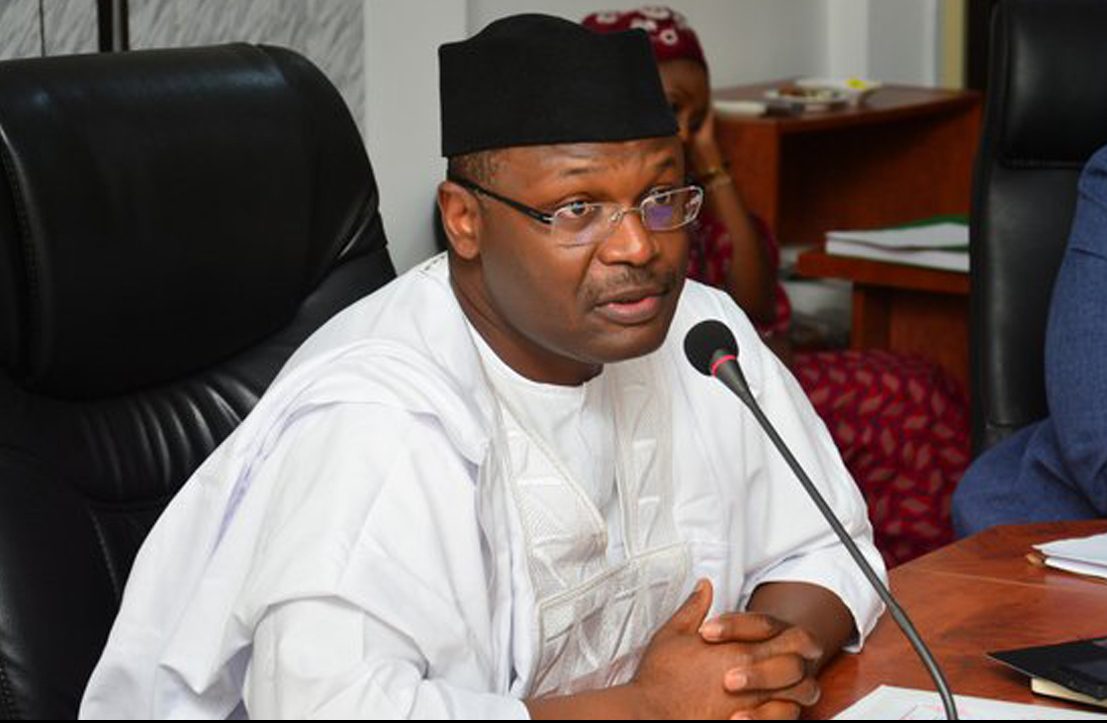FEATURED
2023 Election: EU Observation Mission Rubbishes INEC In Its Report

*Confirms Commission Betrayed Public Trust
*Says Polls Fail Short Minimum Acceptable Standards Set By INEC
The EU Election Observation Mission has taken the Independent National Electoral Commission (INEC) to the cleaners, confirming that the 2023 general election lacked transparency, was not inclusive, and fell short of benchmarks and standards the commission set for itself.
It also said INEC’s action eroded the gains made over time in the nation’s democratic process.
The Mission which released its Final Report on the 2023 general elections at a press conference, Tuesday declared that “public confidence and trust in INEC were severely damaged during the presidential poll and was not restored in state-level elections” forcing leading civil society to call for an independent audit of the entire process.
Barry Andrew, EOM’s Chief Observer who addressed journalists in Abuja noted that across the country” the pre-poll environment was volatile and challenging, affected by economic crises”.
“Fundamental freedoms of assembly and movement were broadly respected, yet the full enjoyment of the latter was impeded by insecurity in some parts of the country.
“Abuse of incumbency by various political office holders distorted the playing field and wide-spread vote buying detracted from appropriate conduct of the elections.
“Incidents of organised violence shortly before and on election days in several states created an environment deterring voter’s participation. The media raised voters’ awareness, fact-checkers stood up against disinformation and civil society demanded INEC’s accountability.
The overall outcome of the polls attests to the continued underrepresentation of marginalised groups in political life.
The observation mission also noted gaps and ambiguities in the electoral Act, especially as it concerns INEC’s accountability and transparency including a lack of “INEC independent structures and capacities to enforce sanctions for electoral offences and breaches of campaign finance rules”
The mission questioned the selection process of those to be appointed to serve as RECs and National Commissioners for an independent body such as INEC.
On the positive side, Andrew noted the determination of Nigerians, especially the youth to embrace tenets of democracy fully, while candidates and parties who disputed the outcomes of the election took their myriads of complaints to the courts.
He said :
“Early in the process, while enjoying a broad stakeholder trust, INEC introduced a series of positive measures to strengthen the conduct of the elections. However, closer to the polls some started to doubt INEC’s administrative and operational efficiency and in-house capacity.
“Public confidence gradually decreased and was severely damaged on 25 February due to its operational failures and lack of transparency. While some corrective measures introduced before the 18 March elections were effective, overall trust was not restored.
“The introduction of the Bimodal Voter Accreditation System (BVAS) and the INEC Results Viewing Portal ([ReV) was widely seen as an important step to ensure the integrity and credibility of the elections. In practice, multiple missteps and lack of transparency before the polls, compounded by the severely delayed display of presidential result forms, dashed the public trust in the election technologies used.
“INEC failed to give a timely and comprehensive explanation for the failures on 25 February, hence the improved online display of results forms from the 18 March state elections just fuelled further speculations about what exactly caused the delays after the presidential poll.
“A total of 93.4 million voters were registered for the 2023 elections. Owing to civic mobilisation during registration, two-thirds of the 9.5 million new registrants were youth.
“Yet, poor institutional planning and, again, lack of transparency negatively affected the collection of Permanent Voter Cards (PVC). Confidence in collection rates per polling unit was undermined due to their belated publication. Overall, an external independent audit could have helped to assure accuracy and inclusiveness of the voter register”.
The mission while 23 recommendations to improve the electoral process going forward, insists that six priority areas needed to be addressed by the government INEC, the legislature and other relevant stakeholders to forestall further reach of regional and international commitments to which the country subscribes to
The Chief Observer listed the
Priority recommendations to include
I. Protect the interests of voters through certainty of law for all stages and aspects of electoral processes by eliminating from electoral law and regulations errors and ambiguities to avoid the potential for conflicting interpretations, and ensuring the revision processes are inclusive.
2. Establish a robust operational framework for the independence, integrity, and efficiency of electoral administration through an inclusive and publicly accountable mechanism for selecting candidates for the posts of INEC commissioners and RECs based on clear criteria of evaluation of merits, qualifications, and verified non-partisanship.
3. Protect the free expression of the will of the voter and the integrity of elections by establishing a robust, transparent, and easily verifiable results processing system with clear rules, These include uploading polling unit results from the polling unit only and in real-time, at each level of collation results forms to be uploaded in real-time, and all Forms to be published in an easily trackable and scrapable database format.
4. Afford adequate protection to freedom of expression by developing a comprehensive operational framework underpinned by the skills and means for ensuring prompt investigation and prosecution of all types of attacks against media practitioners.
5. Undertake urgent and robust affirmative action to ensure meaningful women’s representation through special measures in line with the Beijing principles and the National Gender Policy to increase the representation of women as candidates and in elected office, further supported by cross-sectoral, intensified, and sustained capacity building and sensitisation to eliminate discrimination.
6. Address impunity for electoral offences through robust, well-defined, and effective inter-agency coordination governed by clear rules on non-partisanship, optimisation of resources, delivery of effective investigation and sanctioning, and provision of regular public consolidated information on outcomes.
-
CRIME4 years ago
PSC Dismisses DCP Abba Kyari, To Be Prosecuted Over Alleged $1.1m Fraud
-
FEATURED4 years ago
2022 Will Brighten Possibility Of Osinbajo Presidency, Says TPP
-
FEATURED2 years ago
Buhari’s Ministers, CEOs Should Be Held Accountable Along With Emefiele, Says Timi Frank
-
BUSINESS & ECONOMY2 years ago
Oyedemi Reigns As 2023’s Real Estate Humanitarian Of The Year
-
SPORTS2 years ago
BREAKING: Jürgen Klopp Quits Liverpool As Manager At End Of Season
-
SPORTS2 years ago
Could Liverpool Afford Kylian Mbappe For €200 million? Wages, Transfer Fee
-
ENTERTAINMENT2 years ago
Veteran Nigerian Musician, Basil Akalonu Dies At 72
-
FEATURED2 years ago
Tribunal Judgement: Peter Obi Warns Of Vanishing Electoral Jurisprudence, Heads To Supreme Court
-
BUSINESS & ECONOMY2 years ago
Oyedemi Bags ‘Next Bulls Award’ As BusinessDay Celebrates Top 25 CEOs/ Business Leaders
-
FEATURED4 years ago
2023 Presidency: South East PDP Aspirants Unite, Demand Party Ticket For Zone



































